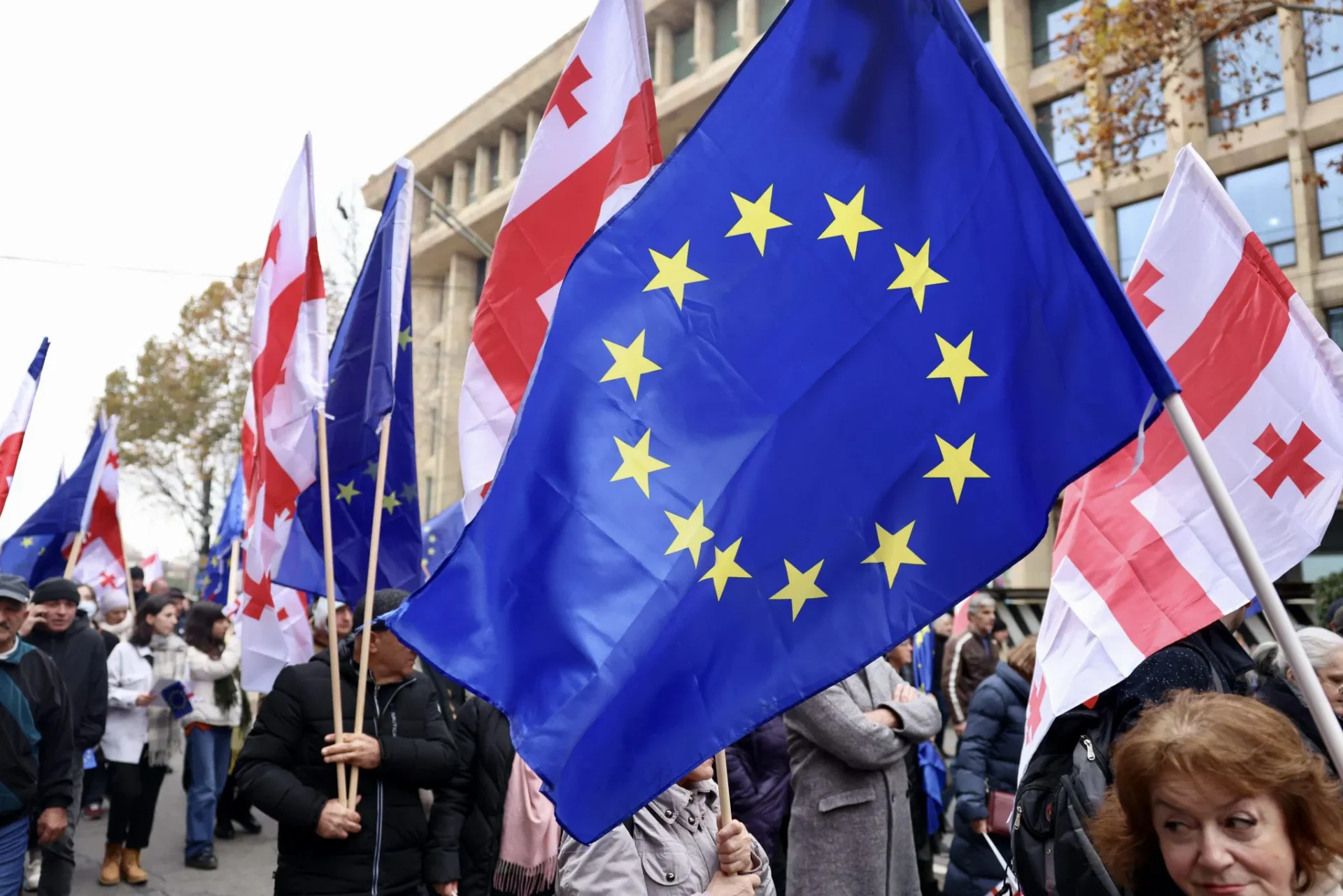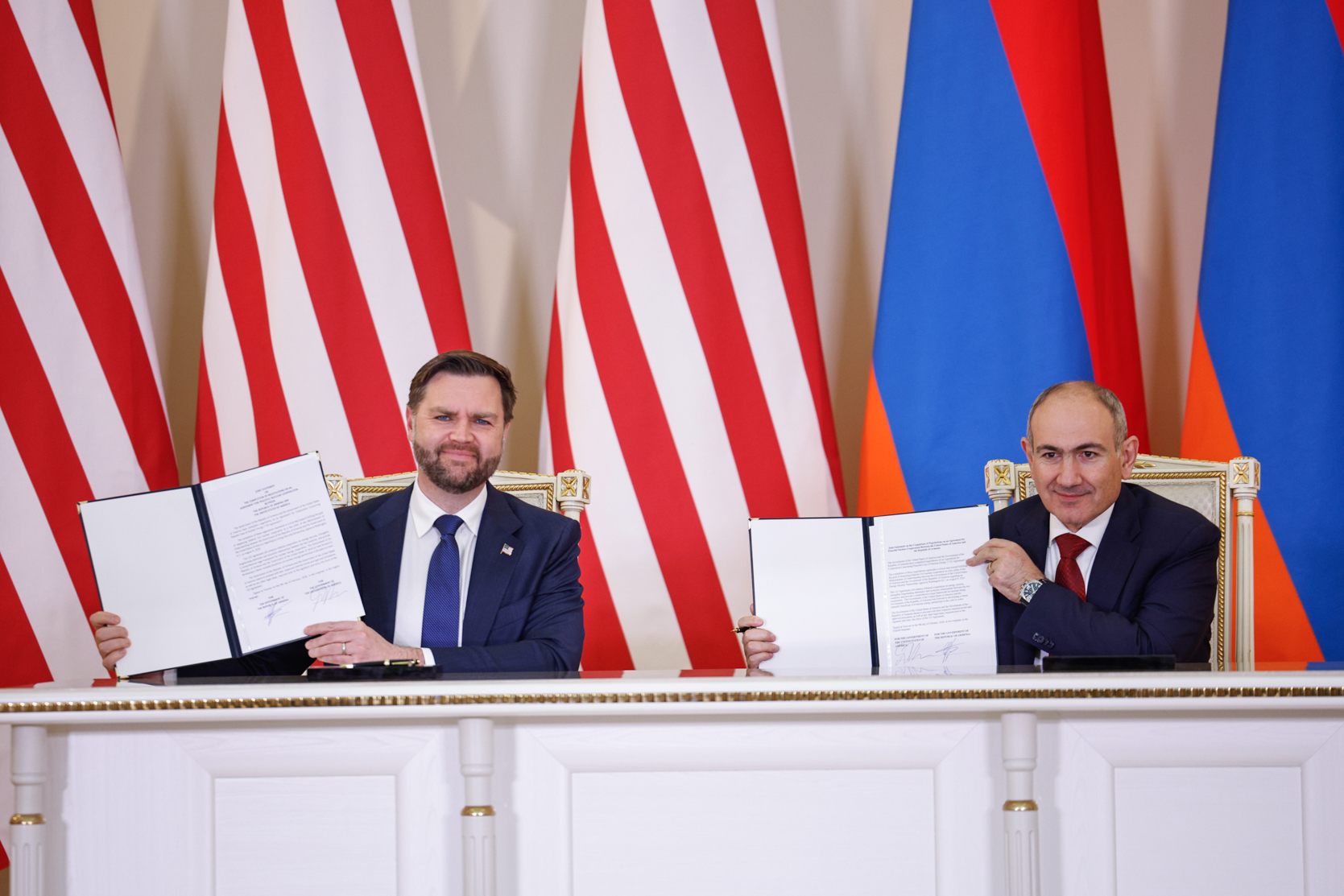
Georgia’s Path to EU Accession Depends on Upcoming Parliamentary Elections
Georgia’s Path to EU Accession Depends on Upcoming Parliamentary Elections
Executive Summary:
- The European Parliament adopted a resolution on October 9, calling on the EU executive body to freeze aid to the Georgian government and impose sanctions against those responsible for Georgia’s democratic backsliding.
- The ruling Georgian Dream party’s campaigns promoting anti-European propaganda as well as spreading anti-EU narratives and conspiracy theories highlight that it has no desire for rapprochement with the European Union.
- The upcoming parliamentary elections in Georgia on October 26 will determine whether Georgia follows its course toward a European future or if the ruling party succeeds in continuing its authoritarian trajectory away from the West.
On October 9, the European Parliament adopted a resolution condemning “the democratic backsliding and threats to political pluralism in Georgia.” The resolution calls on the European Union’s executive body to freeze aid to the Georgian government and impose sanctions against the country’s informal leader, Bidzina Ivanishvili, as well as those responsible for the rollback of democracy in Georgia (Europarl.europa.eu, October 9). The resolution also calls on the Georgian government to end intimidation against opponents, abandon its anti-Western disinformation campaign, impose sanctions on Russia, release former President Mikheil Saakashvili on humanitarian grounds, and ensure a peaceful transfer of power in the event of an electoral defeat for Georgian Dream. Representatives of Georgia’s ruling elite called this resolution “[b]razen interference in the country’s internal affairs and electoral processes” (Interpressnews.ge, October 9). While the European Parliament resolution has no legal force and is more of a symbolic motion, it is a significant blow to the reputation of Georgia’s ruling Georgian Dream party and reduces its chances of success in the upcoming parliamentary elections.
The resolution marks the collapse of the Georgian government’s hopes for resetting EU-Georgia relations. EU officials from the executive body are also signaling that the process of Georgia’s integration into the European Union has been suspended, and, apparently, under the current Georgian government, the EU considers the country’s accession to be practically impossible. According to members of the European Parliament, Georgian Dream’s actions are incompatible with EU values and democratic principles, run counter to Georgia’s ambitions to integrate into the European Union, damage Georgia’s international reputation, and threaten the country’s Euro-Atlantic integration. At the beginning of October, Paweł Herczyński, the EU Ambassador to Georgia, stated that in June of this year, EU institutions had ceased all high-level contact with the Georgian government (Radiotavisupleba.ge, October 4).
The ambassadors of EU member states in Georgia are calling on Georgian citizens to participate in the parliamentary elections on October 26. They hint at the need for a change of power to thaw the frozen process of Georgia’s accession to the European Union. Herczyński states that if the parliamentary elections are not free and fair, then after October 26, the European Union will take all necessary measures to cut ties with Georgia, including those that were once used against Belarus. According to Herczyński, among such measures, EU member countries are actively considering the abolition of the visa-free regime with Georgia (Civil.ge, September 20).
The probability that Georgian Dream will try to meddle in the election results is very high. On October 8, Georgian Dream published the results of sociological surveys of one of the pro-government local campaigns. According to this poll, the ruling Georgian Dream allegedly holds almost 60 percent support among voters, while the largest opposition party, the United National Movement, allegedly holds only 13.6 percent support (Imedinews.ge, October 8). According to these quasi-polls, another opposition coalition, the “Coalition for Change,” has a chance to overcome the electoral threshold and get 10.3 percent support. The publication of this data demonstrates the intentions and preparations of the authorities to illegally appropriate 60 percent of the votes during the elections.
European politicians warn Georgian citizens that if democratic changes do not occur, Georgia may lose its EU candidate status (Interpressnews.ge, October 8). Moscow and Minsk see the process of a dramatic deterioration of relations between Tbilisi and the West as an opportunity to exert influence on the country. They have begun to offer Georgia quasi-integration projects as an alternative to rapprochement with the European Union and the United States. At the end of September, Konstantin Zatulin, the First Deputy Chairman of the Committee on Commonwealth of Independent States (CIS) Issues of the Russian State Duma, proposed that Georgia join the union state of Russia and Belarus (Zatulin.ru, September 25). The CIS was formed immediately after the collapse of the Soviet Union under the leadership of Russia and serves to preserve Russian influence in the post-Soviet space. Georgia was forced to join this union under military and political pressure from Russia in 1993 but was the first country to leave this pro-Kremlin interstate organization after Russia’s military aggression against Georgia in 2008. On September 9, Belarusian leader Alyaksandr Lukashenka echoed this sentiment, stating that Georgia should return to the CIS (RG.ru, October 8).
In the pre-election period, Georgian Dream has resorted to manipulating public opinion, brazenly deceiving supporters of Georgia’s integration with Europe—who constitute a majority of Georgian voters—through campaigning that the main goal of Georgian Dream is also the country’s accession to the European Union. Georgian Dream’s election slogan, “With Peace, with dignity, with prosperity to Europe,” is unconvincing, as various EU representatives have openly declared that Georgian Dream and its actions have all but halted the process of Georgia’s accession to the European Union (1tv.ge, August 25; Europarl.europa.eu, October 9).
Georgian Dream’s pre-election promises that Georgia will become a member of the European Union seem absurd, especially when tensions between the European Union and Georgia have reached a critical point under their leadership. One of the leaders of Georgia’s ruling party and the mayor of Tbilisi, Kakha Kaladze, accused Herczyński of interfering in the country’s electoral process and spoke out in favor of expelling the EU ambassador from the country (Formulanews.ge, October 6). A day before the European Parliament published its resolution, the EU Delegation to Georgia publicized the amount of financial assistance from the European Union that Georgia is already losing due to Georgian Dream’s anti-European policy. According to the EU Delegation to Georgia, “Georgia will lose 121 million euros [$132 million] in EU assistance, as a result of democratic backsliding” (Facebook.com/EUinGeorgia, October 8).
On October 20, Georgian civil society organizations are planning a mass demonstration with the slogan “Georgia chooses Europe” in support of Georgia’s membership in the European Union (TV Pirveli, October 9). The Georgian government’s unfriendly attitude toward the European Union, including promoting anti-European propaganda as well as spreading anti-EU narratives and conspiracy theories, indicates that the Georgian Dream party no longer has the pull or political capital necessary to reset relations with the European Union. This sentiment is supported by a statement from EU High Representative for Foreign Affairs and Security Policy Josep Borrell on October 14. He became the first EU official to use the word “authoritarianism” in relation to Georgia, stating, “The ruling party’s recent actions, statements and electoral promises take the country away from the European path and signal a shift towards authoritarianism” (Eeas.europa.eu, October 14). On the one hand, Georgia has come closer to joining the European Union than ever before in its history. On the other hand, Georgian Dream has taken a more direct trajectory toward authoritarian rule and rapprochement with the Kremlin. Taken collectively, comments from Georgian Dream and EU officials suggest that the October 26 parliamentary election will decide not only the fate of Georgian democracy, but also whether the country’s future is European.


